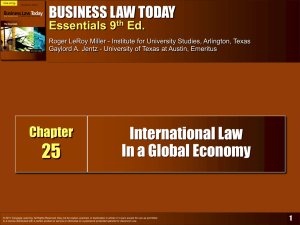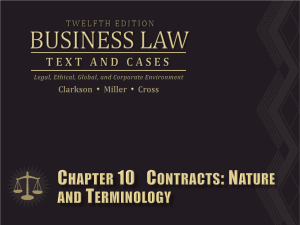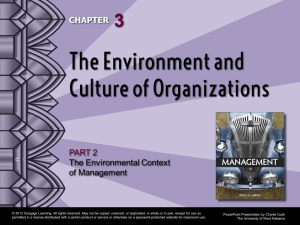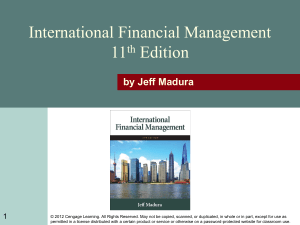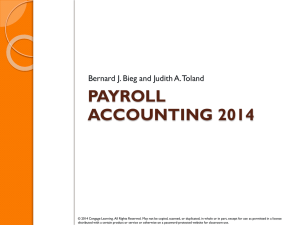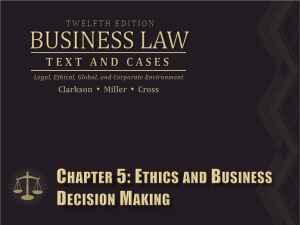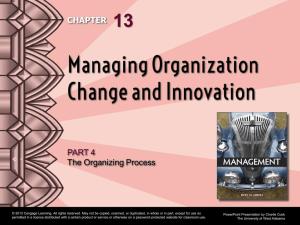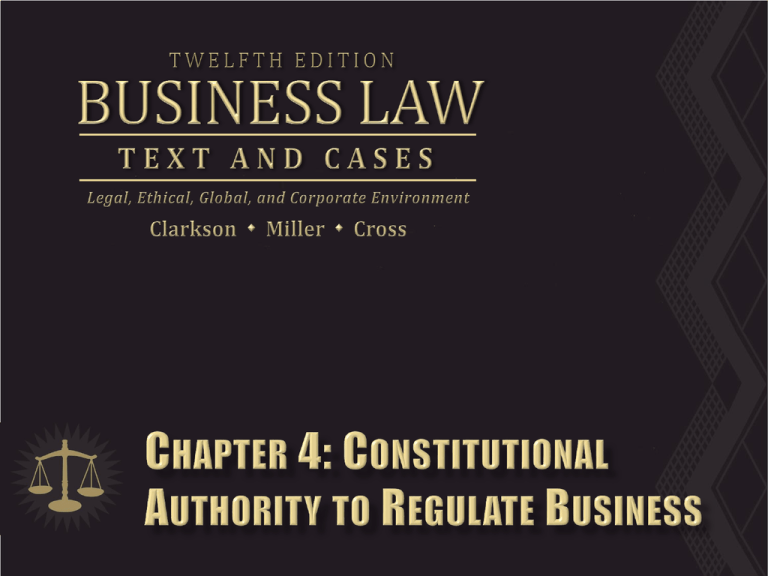
Before the Revolutionary War,
States wanted a confederation with
weak national government and very
limited powers. After the war
ended, the States voted to create a
new, federal government that
shared power with States.
2
© 2012 Cengage Learning. All Rights Reserved. May not be copied, scanned, or duplicated, in whole or in part, except for use as permitted in a
license distributed with a certain product or service or otherwise on a password-protected website for classroom use.
Federal
Form of Government:
Shares power between national and
state governments.
National government has limited,
enumerated powers delegated from
States.
3
© 2012 Cengage Learning. All Rights Reserved. May not be copied, scanned, or duplicated, in whole or in part, except for use as permitted in a
license distributed with a certain product or service or otherwise on a password-protected website for classroom use.
Regulatory
Powers of States.
10th Amendment.
Police Powers: order, safety, morals.
4
© 2012 Cengage Learning. All Rights Reserved. May not be copied, scanned, or duplicated, in whole or in part, except for use as permitted in a
license distributed with a certain product or service or otherwise on a password-protected website for classroom use.
Privileges
and Immunities
Clause.
Art. IV §2 of the U.S. Constitution.
Prevents state from imposing
unreasonable burdens on citizens –
particularly with regard to basic and
essential activities.
5
© 2012 Cengage Learning. All Rights Reserved. May not be copied, scanned, or duplicated, in whole or in part, except for use as permitted in a
license distributed with a certain product or service or otherwise on a password-protected website for classroom use.
Full Faith and Credit Clause (Art. IV
§1).
Applies only to civil matters.
Ensures that any judicial decision with
respect to such property rights will be
honored and enforced in all states.
6
© 2012 Cengage Learning. All Rights Reserved. May not be copied, scanned, or duplicated, in whole or in part, except for use as permitted in a
license distributed with a certain product or service or otherwise on a password-protected website for classroom use.
National government provides
checks and balances among three
branches: executive, legislative and
judicial.
Legislative (Congress): Creates laws.
Executive (President/Agencies): Enforce
laws.
Judicial (Federal Courts): Interprets laws.
7
© 2012 Cengage Learning. All Rights Reserved. May not be copied, scanned, or duplicated, in whole or in part, except for use as permitted in a
license distributed with a certain product or service or otherwise on a password-protected website for classroom use.
Power to regulate interstate
commerce defined in Gibbons v.
Ogden (1824): activities that
“substantially affect interstate
commerce.”
Expansion to purely interstate
businesses began with Wickard v.
Fillburn (1942).
© 2012 Cengage Learning. All Rights Reserved. May not be copied, scanned, or duplicated, in whole or in part, except for use as permitted in a
license distributed with a certain product or service or otherwise on a password-protected website for classroom use.
8
In 1942, Supreme Court expanded
commerce clause to purely interstate
businesses (Wickard v. Fillburn).
In 1964, Supreme Court prohibited
racial discrimination in interstate
commerce (Heart of Atlanta Motel v.
U.S.).
9
© 2012 Cengage Learning. All Rights Reserved. May not be copied, scanned, or duplicated, in whole or in part, except for use as permitted in a
license distributed with a certain product or service or otherwise on a password-protected website for classroom use.
Today, the Commerce Clause
authorizes the national government
to regulate virtually any business
enterprise, including the internetbased. Limits: U.S. v. Lopez (1995).
What about medical marijuana and
the commerce clause?
10
© 2012 Cengage Learning. All Rights Reserved. May not be copied, scanned, or duplicated, in whole or in part, except for use as permitted in a
license distributed with a certain product or service or otherwise on a password-protected website for classroom use.
Generally, federal government has
exclusive authority to regulate
commerce that substantially affects
trade among the states.
States possess inherent police
powers to regulate health, safety,
public order, morals and general
welfare.
11
© 2012 Cengage Learning. All Rights Reserved. May not be copied, scanned, or duplicated, in whole or in part, except for use as permitted in a
license distributed with a certain product or service or otherwise on a password-protected website for classroom use.
However, state police powers or
regulations that substantially
interfere with interstate commerce
will be struck down.
CASE 4.1 Family Winemakers of
California v. Jenkins (2010). Did the
State of Massachusetts discriminate
against out-of-state wineries?
12
© 2012 Cengage Learning. All Rights Reserved. May not be copied, scanned, or duplicated, in whole or in part, except for use as permitted in a
license distributed with a certain product or service or otherwise on a password-protected website for classroom use.
Article VI of the Constitution
provides that the Constitution, laws,
and treaties of the United States are
the “Supreme Law of the Land.”
In case of direct conflict between
state and federal law, state law is
invalid.
13
© 2012 Cengage Learning. All Rights Reserved. May not be copied, scanned, or duplicated, in whole or in part, except for use as permitted in a
license distributed with a certain product or service or otherwise on a password-protected website for classroom use.
A valid federal statute or regulation
will take precedence over a
conflicting state or local statute.
Preemption occurs when Congress
chooses to act exclusively when
national and state governments
have concurrent powers
14
© 2012 Cengage Learning. All Rights Reserved. May not be copied, scanned, or duplicated, in whole or in part, except for use as permitted in a
license distributed with a certain product or service or otherwise on a password-protected website for classroom use.
Article I, Section 8: Congress has the
“Power to lay and collect Taxes,
Duties, Imposts, and Excises” which
shall be “uniform” among the
states.
Expansion of commerce clause gives
taxing power as well.
15
© 2012 Cengage Learning. All Rights Reserved. May not be copied, scanned, or duplicated, in whole or in part, except for use as permitted in a
license distributed with a certain product or service or otherwise on a password-protected website for classroom use.
First Ten Amendments to the United
States Constitution are called the
Bill of Rights.
All apply to natural persons and
most apply to business entities as
well.
16
© 2012 Cengage Learning. All Rights Reserved. May not be copied, scanned, or duplicated, in whole or in part, except for use as permitted in a
license distributed with a certain product or service or otherwise on a password-protected website for classroom use.
17
© 2012 Cengage Learning. All Rights Reserved. May not be copied, scanned, or duplicated, in whole or in part, except for use as permitted in a
license distributed with a certain product or service or otherwise on a password-protected website for classroom use.
Originally the Bill of Rights was a
limit on the national government’s
powers. Starting in 1925, Bill of
Rights was applied to States via the
“due process” clause of the 14th
Amendment.
These rights are not absolute.
18
© 2012 Cengage Learning. All Rights Reserved. May not be copied, scanned, or duplicated, in whole or in part, except for use as permitted in a
license distributed with a certain product or service or otherwise on a password-protected website for classroom use.
Afforded highest protection by
courts.
Symbolic Speech.
Texas v. Johnson (1989), the “flag
burning” case.
19
© 2012 Cengage Learning. All Rights Reserved. May not be copied, scanned, or duplicated, in whole or in part, except for use as permitted in a
license distributed with a certain product or service or otherwise on a password-protected website for classroom use.
Reasonable Restrictions.
Balance must be struck between a
government’s obligation to protect its
citizens versus a citizen’s right to speech.
If restriction is content neutral,
restrictions must target some societal
problem – not to primarily suppress the
message.
20
© 2012 Cengage Learning. All Rights Reserved. May not be copied, scanned, or duplicated, in whole or in part, except for use as permitted in a
license distributed with a certain product or service or otherwise on a password-protected website for classroom use.
Political speech by corporations is
protected by the First Amendment.
In Citizens United v. Federal Election
Commission (2010) the Supreme
Court ruled that corporations can
spend freely to support or oppose
candidates for President and
Congress.
21
© 2012 Cengage Learning. All Rights Reserved. May not be copied, scanned, or duplicated, in whole or in part, except for use as permitted in a
license distributed with a certain product or service or otherwise on a password-protected website for classroom use.
Courts give substantial protection to
commercial speech (advertising).
Restrictions must: Implement
substantial government interest;
directly advance that interest; and
go no further than necessary.
22
© 2012 Cengage Learning. All Rights Reserved. May not be copied, scanned, or duplicated, in whole or in part, except for use as permitted in a
license distributed with a certain product or service or otherwise on a password-protected website for classroom use.
CASE 4.2: Bad Frog Brewery, Inc. v.
New York State Liquor Authority
(2003). Did the State
unconstitutionally restrict
commercial speech when it
prohibited a certain gesture
(illustration) on beer labels?
23
© 2012 Cengage Learning. All Rights Reserved. May not be copied, scanned, or duplicated, in whole or in part, except for use as permitted in a
license distributed with a certain product or service or otherwise on a password-protected website for classroom use.
Certain types of speech are not
protected by the First Amendment:
Slander.
Obscenity (see Miller v. California).
Fighting Words.
Online Obscenity:
CDA, COPA, Children’s Internet Protection
Act, Children’s Internet Protection Act
(2000).
© 2012 Cengage Learning. All Rights Reserved. May not be copied, scanned, or duplicated, in whole or in part, except for use as permitted in a
license distributed with a certain product or service or otherwise on a password-protected website for classroom use.
24
First Amendment may not
“establish” a religion or prohibit the
“free exercise” of religion.
The Establishment Clause:
Prohibits government from establishing
a state-sponsored religion, or passing
laws that favor one over the other.
25
© 2012 Cengage Learning. All Rights Reserved. May not be copied, scanned, or duplicated, in whole or in part, except for use as permitted in a
license distributed with a certain product or service or otherwise on a password-protected website for classroom use.
Establishment Clause.
CASE 4.3
In Re Episcopal Church
Cases (2009). Can a secular court
resolve an internal dispute about
church property without becoming
impermissibly entangled with
religion?
26
© 2012 Cengage Learning. All Rights Reserved. May not be copied, scanned, or duplicated, in whole or in part, except for use as permitted in a
license distributed with a certain product or service or otherwise on a password-protected website for classroom use.
Free Exercise Clause: First
Amendment guarantees the “free
exercise” of religion.
Employers must reasonably
accommodate beliefs as long as
employee has sincerely held beliefs.
27
© 2012 Cengage Learning. All Rights Reserved. May not be copied, scanned, or duplicated, in whole or in part, except for use as permitted in a
license distributed with a certain product or service or otherwise on a password-protected website for classroom use.
The Fourth Amendment requires
search warrants to have “probable
cause.”
General searches through personal
belongings are illegal.
Search warrants must be specific.
28
© 2012 Cengage Learning. All Rights Reserved. May not be copied, scanned, or duplicated, in whole or in part, except for use as permitted in a
license distributed with a certain product or service or otherwise on a password-protected website for classroom use.
Searches and Seizures of Business:
generally business inspectors must
have a warrant.
However, a warrantless search is
permissible for seizure of spoiled or
contaminated food.
29
© 2012 Cengage Learning. All Rights Reserved. May not be copied, scanned, or duplicated, in whole or in part, except for use as permitted in a
license distributed with a certain product or service or otherwise on a password-protected website for classroom use.
Fifth Amendment guarantees no
person can be compelled to testify
against himself in a criminal
proceeding.
Does not apply to corporations or
partnerships.
30
© 2012 Cengage Learning. All Rights Reserved. May not be copied, scanned, or duplicated, in whole or in part, except for use as permitted in a
license distributed with a certain product or service or otherwise on a password-protected website for classroom use.
Fifth and Fourteenth Amendments
provide “no person shall be
deprived of life, liberty or property
without due process of law.”
Procedural and Substantive issues.
31
© 2012 Cengage Learning. All Rights Reserved. May not be copied, scanned, or duplicated, in whole or in part, except for use as permitted in a
license distributed with a certain product or service or otherwise on a password-protected website for classroom use.
Procedures depriving an individual
of her rights must be fair and
equitable.
Constitution requires adequate
notice and a fair and impartial
hearing before a disinterested
magistrate.
32
© 2012 Cengage Learning. All Rights Reserved. May not be copied, scanned, or duplicated, in whole or in part, except for use as permitted in a
license distributed with a certain product or service or otherwise on a password-protected website for classroom use.
Focuses on the content or
substance of legislation.
Laws limiting fundamental rights
(speech, privacy, religion) must have
a “compelling state interest.”
Laws limiting non-fundamental
rights require only a “rational basis.”
33
© 2012 Cengage Learning. All Rights Reserved. May not be copied, scanned, or duplicated, in whole or in part, except for use as permitted in a
license distributed with a certain product or service or otherwise on a password-protected website for classroom use.
Strict
Scrutiny Test.
Laws that affect fundamental rights of
similarly situated individuals differently are
subject to the “strict scrutiny” test.
Any “suspect class” (race, national origin)
must serve a “compelling state interest”
which includes remedying past
discrimination.
34
© 2012 Cengage Learning. All Rights Reserved. May not be copied, scanned, or duplicated, in whole or in part, except for use as permitted in a
license distributed with a certain product or service or otherwise on a password-protected website for classroom use.
Intermediate Scrutiny.
Applied to laws involving gender or
legitimacy.
To be constitutional laws must be
substantially related to important
government objectives.
(EXAMPLE: Illegitimate teenage
pregnancy).
35
© 2012 Cengage Learning. All Rights Reserved. May not be copied, scanned, or duplicated, in whole or in part, except for use as permitted in a
license distributed with a certain product or service or otherwise on a password-protected website for classroom use.
“Rational Basis” Test.
Applied to matters of economic or
social welfare.
Laws will be constitutional if there is
a rational basis relating to legitimate
government interest.
36
© 2012 Cengage Learning. All Rights Reserved. May not be copied, scanned, or duplicated, in whole or in part, except for use as permitted in a
license distributed with a certain product or service or otherwise on a password-protected website for classroom use.
Fundamental right not expressly
found in the constitution, but
derived from First, Fifth and
Fourteenth Amendments.
Laws and policies affecting privacy
are subject to the compelling
interest test.
37
© 2012 Cengage Learning. All Rights Reserved. May not be copied, scanned, or duplicated, in whole or in part, except for use as permitted in a
license distributed with a certain product or service or otherwise on a password-protected website for classroom use.
Federal Statutes Affecting Privacy
Rights.
“Pretexting” for financial
information is illegal under GrammLeach-Bliley.
Privacy Act of 1974.
HIPAA of 1996.
USA PATRIOT Act of 2001.
38
© 2012 Cengage Learning. All Rights Reserved. May not be copied, scanned, or duplicated, in whole or in part, except for use as permitted in a
license distributed with a certain product or service or otherwise on a password-protected website for classroom use.


